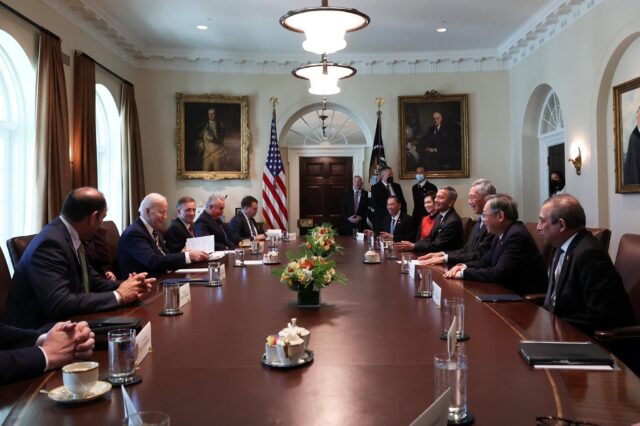
- A planned Advanced Manufacturing Business Development US trade mission aims to promote standards that will improve manufacturing resiliency and facilitate new opportunities for collaboration among the Singapore and US private sectors
- Singapore and the US will collaborate on efforts to develop interoperable artificial intelligence governance frameworks
- DOC and MCI plan to collaborate on cybersecurity best practices, including on regional capacity building programs on smart cities
US Commerce Secretary Gina M. Raimondo met in Washington on March 29 with Singapore’s Minister for Trade and Industry Gan Kim Yong and Minister for Communications and Information Josephine Teo to discuss coordination efforts on the Indo-Pacific Economic Framework.
Gan and Yan are visiting the United States as part of Prime Minister Lee Hsien Loong’s delegation.
Raimondo shared updates on the Department of Commerce (DOC)’s coordination with the Ministry of Trade and Industry (MIT) on efforts related to the launch of the Framework.
Concerning US-Singapore bilateral commercial relations, the commerce secretary and the Singapore delegation discussed developments pertaining to their Partnership for Growth and Innovation (PGI) initiative.
In particular, Raimondo highlighted the upcoming Advanced Manufacturing Business Development Mission, which will be led by the Commerce Department and coordinated with the support of the PGI later this year.
She welcomed the opportunity to work with Singapore on regional cybersecurity best practices, including through smart cities programming with the ASEAN-Singapore Cybersecurity Centre of Excellence.
She stressed the importance of collaborating with Singapore to make progress on shared climate and decarbonization goals, including by mobilizing the private sector to advance innovative clean energy and envirotech solutions and services.
After the meeting, the two sides disclosed in a joint press release details of the new collaboration between the two countries on cybersecurity, export and investment promotion and manufacturing under the PGI, which Gan and Raimondo signed in October 2021.
“The PGI is a bilateral economic cooperation platform designed to secure inclusive growth for our economies and regions by strengthening US-Singapore collaborations in new and forward-looking areas,” the press release said.
Under the PGI, both sides are exploring and advancing cooperation in four pillars: a) digital economy and smart cities; b) energy and environmental technologies; c) advanced manufacturing and supply chain resilience; and d) healthcare. In each of these areas, the US and Singapore are identifying ways to collaborate on common technical standards and build more trustworthy and interoperable systems.
For instance, PGI programming is being planned to support regional development of digital trade standards; expand participation in the Asia-Pacific Economic Cooperation (APEC) Cross Border Privacy Rules (CBPR) System to facilitate global interoperability between different data privacy regimes; and support the growing need for US and Singapore companies to operationalize trustworthy and responsible uses of Artificial Intelligence (AI) applications.
Under the clean energy and environmental technology pillar, the US and Singapore are co-organizing business networking events to facilitate public-private collaboration across the region and increase the adoption, deployment, and trade of clean energy solutions and environmental technologies and services.
On the margins of Prime Minister Lee’s visit to the United States, the DOC and Singapore’s MTI, Ministry of Communications and Information (MCI), and Infocomm Media Development Authority (IMDA) have announced three new areas of cooperation under the PGI.
1. Alignment of AI frameworks and toolkits
DOC and IMDA will collaborate on efforts to develop interoperable artificial intelligence governance frameworks and support industry’s adoption of ethical AI. DOC and IMDA will co-organize mapping exercises, workshops, and other events with US and Singapore companies’ participation.
2. US advanced manufacturing trade mission to Singapore and other markets in the region
MTI, Enterprise Singapore, and the Singapore Economic Development Board welcome DOC’s plans for a senior government official-led Advanced Manufacturing Business Development Mission to Singapore and other countries in the region, including Indonesia and Japan. The US trade mission aims to promote standards that will improve manufacturing resiliency and facilitate new opportunities for collaboration among the Singapore and US private sectors.
3. Southeast Asia regional collaboration on cybersecurity
DOC and MCI plan to collaborate on cybersecurity best practices, including on regional capacity building programs on smart cities through the ASEAN-Singapore Cybersecurity Centre of Excellence.
Raimondo, Gan and Teo commended the continued progress made under the PGI.
Raimondo said: “Since its signing in October and my trip to Singapore in November 2021, the PGI has provided a platform for consistent economic engagement with Singapore on topics such as healthcare, digital and advanced manufacturing standards, and clean energy.
“This work demonstrates the Commerce Department’s continued commitment to foster collaboration among US and Singapore companies on emerging topics and issues that will not only allow us to build back from the pandemic, but also help ensure that economic growth in the future is both robust and inclusive.”
For his part, Gan commented: “The PGI serves as a springboard to deepen economic collaboration between the US and Southeast Asia. Through this initiative, we are bringing together our private sectors to strengthen trade and investment collaboration, starting with four pillars that pose profound challenges and offer tremendous opportunities to our societies and economies.
“We will welcome businesses and governments from the broader Southeast Asia region to participate in PGI activities, so that we can emerge stronger together. We look forward to pursuing more collaborations under the PGI in the coming years.”
Teo stated: “The digital pillar of the PGI reflects how the bilateral relations between our countries are advancing in emerging areas of cooperation. This will enable inclusive participation by our companies and people in the growing digital economies in our countries and regionally.
“One practical example of our digital cooperation is on aligning our respective AI governance frameworks. Companies can expect to deploy AI across borders with greater ease, to seize [on] innovation opportunities while managing the risks. We look forward to tangible outcomes from our ongoing digital and cyber workstreams.”








